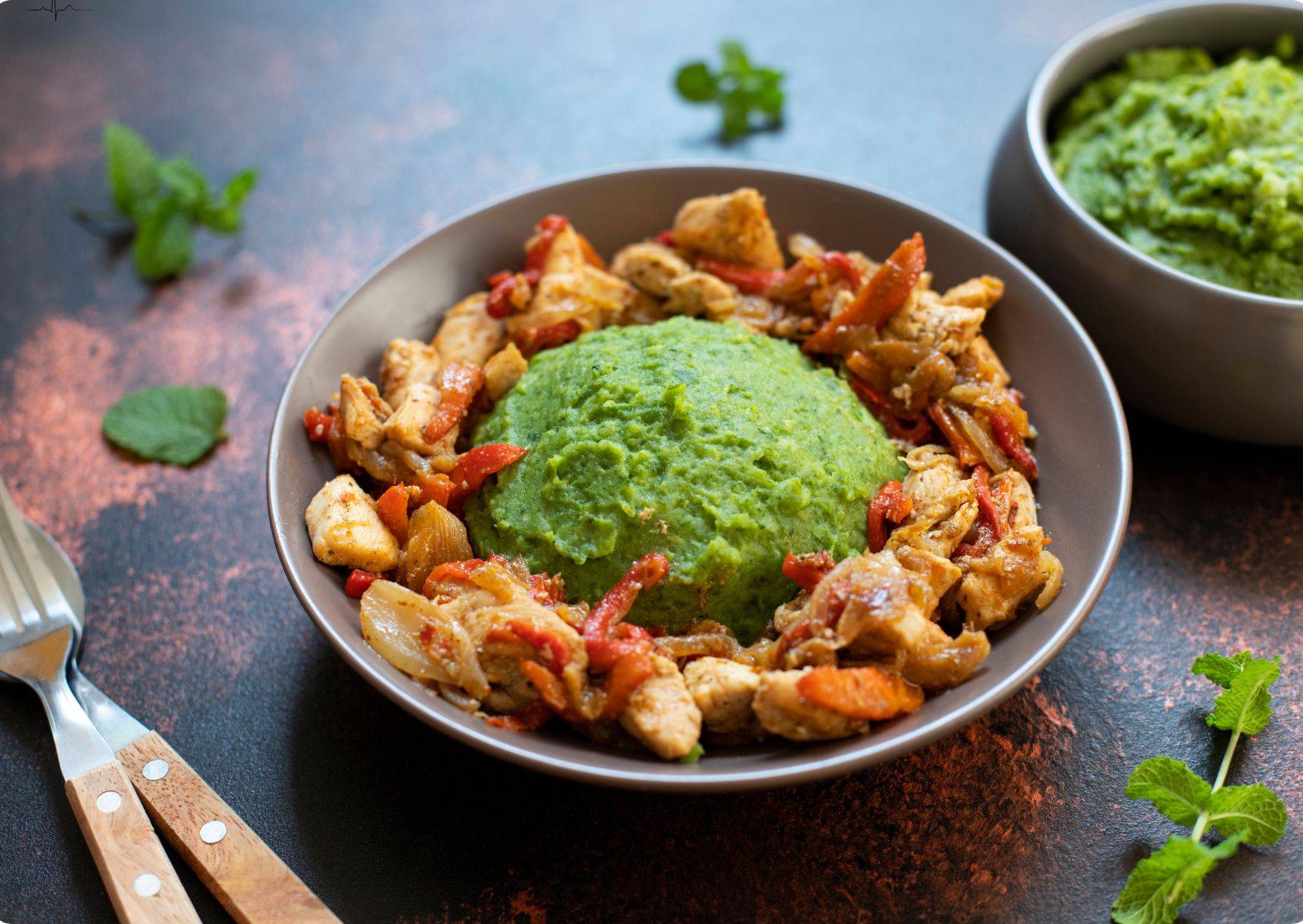Kenyan cuisine
“The best dishes are those cooked with love”
Description
Overview
Discover the rich flavors and diverse culinary traditions of Kenya through our online Kenyan cuisine course. Known for its vibrant and varied dishes, Kenyan cuisine draws from a wide array of cultural influences, including indigenous communities, coastal Swahili, Indian, Arabic, and European traditions. This comprehensive course offers an immersive experience that takes you through the essential ingredients, cooking techniques, and cultural significance of Kenyan cuisine.
Kenya’s cuisine is a perfect blend of simplicity and sophistication, with dishes ranging from hearty stews to light snacks, perfect for any occasion. From the famous Nyama Choma (grilled meat) and Ugali (maize porridge) to the tropical and spicy flavors of the Coastal Kenyan dishes, this course introduces you to a variety of iconic meals. The course provides an excellent foundation in the basics of Kenyan cuisine, but it also explores the regional specialties that make Kenyan food unique.
Our best Kenyan cuisine course will teach you how to make traditional Kenyan meals using fresh, locally-sourced ingredients. Whether you’re interested in learning how to prepare a flavorful stew like Sukuma (collard greens) or mastering the art of cooking Chapati (flatbread), this course offers step-by-step guidance that makes it easy to follow along. You’ll also learn about the cooking methods that have been passed down through generations, and the importance of food in Kenyan culture.
Kenyan cuisine is more than just a collection of recipes—it is a way of life. The course will highlight the cultural importance of food in Kenyan society, including how meals are often shared with family and friends as a way to bond, celebrate, and pass down traditions. Whether you’re based in the UK, the US, or anywhere else, this online Kenyan cuisine course offers the flexibility to learn at your own pace and convenience.
Throughout the course, you will explore the fundamental ingredients of Kenyan cooking, such as maize, beans, meat (especially beef, goat, and chicken), and tropical fruits. The diverse cooking techniques such as grilling, frying, and slow-cooking will give you the skills you need to prepare authentic dishes that reflect the heart of Kenyan cooking.
Description
Why Take the Kenyan Cuisine Course?
If you’re passionate about exploring world cuisines, learning Kenyan cuisine offers an exciting opportunity to dive into one of Africa’s most flavorful and diverse culinary traditions. Kenya’s rich cultural tapestry is reflected in its food, making Kenyan cuisine a unique and rewarding field to study. With influences from local tribes, coastal Swahili cultures, Indian, and Arab traders, Kenyan cuisine provides a broad array of flavors, textures, and techniques.
By taking this online Kenyan cuisine course, you will not only gain practical cooking skills but also explore the deep cultural significance of food in Kenyan society. Food in Kenya is a central part of community and family life, and each dish tells a story. Learning to cook these meals will not only make you a better cook but will also deepen your understanding of Kenyan culture.
Kenyan food is varied and diverse. In the highlands, you will find meals made from maize, beans, and vegetables, whereas in the coastal region, seafood plays a major role. Meat-based dishes, such as Nyama Choma (grilled meat), are staples, and Ugali, the national dish made from maize, is a cornerstone of most meals. This course provides the tools and knowledge you need to prepare these iconic dishes and understand their place in Kenyan life.
Additionally, the course offers insight into the regional variations of Kenyan cuisine. Coastal Kenyan cuisine, with its spicy and aromatic dishes, differs greatly from the hearty stews of the central highlands. This course will give you a comprehensive look at the regional diversity within Kenyan cooking, helping you appreciate how geography and culture have shaped the country’s food traditions.
Whether you’re looking to impress your friends with an authentic Kenyan dinner or you want to broaden your culinary knowledge, this course will give you the skills you need to create delicious, authentic Kenyan dishes. The lessons are designed to be easy to follow, even for beginners, and can be done at your own pace from the comfort of your home.
What Will You Learn in This Course?
The Essential Ingredients of Kenyan Cuisine:
- Maize: A staple in many Kenyan dishes, learn how to make Ugali, a thick maize porridge that is served alongside meats and vegetables.
- Beans and Vegetables: Discover how legumes and vegetables, such as Sukuma (collard greens) and Githeri (a hearty bean and maize stew), are integral to Kenyan meals.
- Meat: Explore the various types of meat, especially beef, goat, and chicken, and learn how they are prepared in dishes like Nyama Choma (grilled meat) and Stews.
- Tropical Fruits: Learn how fruits like bananas, mangoes, and pineapples are used in Kenyan cooking, either as a side dish or in refreshing beverages.
- Spices and Herbs: Understand the role of spices such as Ginger, Garlic, Turmeric, and Coriander, which give Kenyan dishes their distinctive flavors.
Kenyan Cooking Techniques:
- Grilling and Roasting: Master the art of grilling meat over open flames to create the famous Nyama Choma.
- Slow Cooking: Learn how to prepare stews and soups by slow-cooking meat and vegetables to create rich, flavorful dishes.
- Frying and Sautéing: Gain skills in frying Chapati, and sautéing vegetables to enhance the taste of your dishes.
- Steaming: Understand how to steam maize and vegetables to retain nutrients and create wholesome meals.
Traditional Kenyan Dishes:
- Ugali: Learn the technique to prepare Ugali, which is served with nearly every meal in Kenya.
- Nyama Choma: Master this popular grilled meat dish, often served during family gatherings or special occasions.
- Sukuma: Learn how to make Sukuma, a flavorful collard greens dish that is served with almost every Kenyan meal.
- Githeri: Discover the perfect balance of beans, maize, and vegetables in this traditional Kenyan stew.
- Chapati: Master making Chapati, the beloved flatbread that accompanies many Kenyan meals.
Kenyan Food Culture:
- The Role of Food in Kenyan Life: Explore how food in Kenya brings people together, whether it’s at family meals or during public celebrations.
- Community Cooking: Learn how food is prepared and shared during important ceremonies and celebrations, such as weddings, festivals, and public holidays.
- Food as a Reflection of Kenyan Heritage: Understand how Kenyan cuisine reflects the history, geography, and cultural diversity of the country.
Why Take This Course?
- Comprehensive Learning: Gain an in-depth understanding of Kenyan food, from ingredients and techniques to cultural insights.
- Hands-On Approach: With easy-to-follow lessons, you’ll be able to recreate traditional Kenyan dishes at home and bring a taste of Kenya to your kitchen.
- Cultural Insight: Learn the importance of food in Kenyan life, and how meals are more than just nourishment—they are a vital part of social and cultural identity.
- Diverse Flavors: Experience a wide variety of flavors, from the simple and hearty meals of the highlands to the spicy and aromatic dishes of the coast.
This Course Best Fits For
This Kenyan cuisine course is ideal for:
- Food Lovers: If you’re fascinated by global cuisines, Kenyan food offers a rich and diverse culinary experience that’s both flavorful and unique.
- Professional Chefs: Expand your culinary expertise by learning the diverse techniques and dishes that make up Kenyan cuisine.
- Home Cooks: Whether you’re just starting out or are already an experienced cook, this course offers practical knowledge that will help you master traditional Kenyan dishes.
- Cultural Enthusiasts: If you’re interested in exploring how food ties into culture, this course will give you deep insights into the significance of meals in Kenyan society.
- Anyone Looking to Try Something New: If you’re seeking to broaden your culinary horizons, this course offers exciting new dishes to add to your repertoire.
Requirements
To get the most out of this Kenyan cuisine course, you will need:
- Basic Cooking Equipment: A stove, pots, pans, and utensils to prepare the dishes.
- Key Ingredients: Common ingredients such as maize flour, beans, meat, and spices. Specialty items may need to be sourced from international markets or online.
- A Passion for Cooking: Whether you’re a seasoned cook or a beginner, all you need is an enthusiasm for trying new flavors and techniques.
Career Path
Learning Kenyan cuisine can open the door to various career opportunities, including:
- Culinary Instructor: Share your knowledge of Kenyan cuisine by teaching others how to prepare authentic dishes.
- Restaurant Owner or Chef: Open a Kenyan restaurant or start a catering service that specializes in traditional Kenyan meals.
- Food Blogger or Content Creator: Share your culinary journey with others through blogs or social media platforms.
- Cultural Consultant: Work with organizations or companies to promote Kenyan food culture.
Course FAQ
Q: What is included in the Kenyan cuisine course? A: This course includes video lessons, recipes, cooking techniques, and cultural insights into Kenyan cuisine.
Q: Do I need any special skills or knowledge to take the course? A: No, this course is designed for all skill levels, from beginners to advanced cooks.
Q: Can I take the course if I’m based outside Kenya? A: Absolutely! This online Kenyan cuisine course is available worldwide, including in the UK.
Q: How long does the course take? A: The course is self-paced, so you can take as much time as you need to complete it.
Q: Will I receive a certificate after completing the course? A: Yes, upon completion, you’ll receive a certificate to showcase your newfound skills in Kenyan cuisine.
Embark on a culinary adventure and expand your cooking horizons with our Kenyan cuisine course!

- LevelAll Levels
- Last UpdatedJanuary 13, 2025
Student Ratings & Reviews

